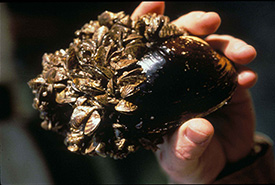Pack your bags, zebra mussels!

Zebra mussels (Photo by U.S. Fish and Wildlife Service)
Back in the fall of 2013, zebra mussels were found in Lake Winnipeg — much to everyone’s alarm. The news broke and it seemed almost instantly that organizations like Manitoba Conservation and Water Stewardship leapt into action to come up with a plan to treat this highly invasive species.
Zebra mussels are a great concern to all those who enjoy Manitoba’s waterways. This aquatic invasive species was first introduced in the 1980s by transoceanic ships and has since spread into the Great Lakes and southeastern North America. Zebra mussels severely impact the environment around them. They stick to almost any flat surface, impacting water flow in pipes, clogging water intake pipes on boats and sticking to the bottom of boats. Not only do they reduce food availability for other organisms, throwing off food webs, but their sharp shells litter beaches making it hard for beach-goers to enjoy the outdoors.
To combat this serious problem, potash was added to the water in curtained off areas in Lake Manitoba to kill off the zebra mussels while not harming fish or other mollusks in the area. By June 14 all treatments had finished and the focus had shifted from treatment to containment. The best way to do this is through education and awareness to prevent more of these pesky mussels from getting into our lakes.
So, what can you do to help? You can:
- Clean and inspect watercraft, trailers and all water-based equipment.
- Drain water from watercraft and all water-based equipment.
- Dry all equipment, boots and clothing before transporting them to another water body.
- Dispose unwanted bait in the trash and dump all water from bait buckets on land away from any water body.
If we all make an effort to follow these simple steps, we can help prevent the spread of zebra mussels!
Update: As of August 12, 2014 a report has come in stating that larvae have been found in the lake post-treatment. However, it is reported that none of these larvae were found in the harbours that were treated with potash back in June. Unfortunately, it only takes one contaminated boat to allow zebra mussels to spread, making the Clean, Drain, Dry and Dispose plan even more important to ensure they aren’t allowed to spread any further.


